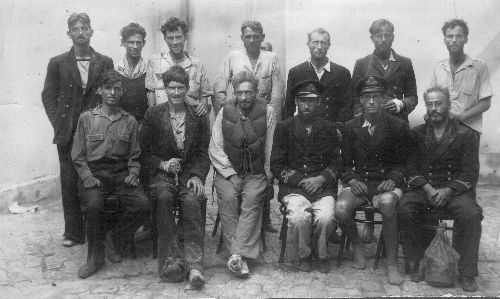- Author
- McIntosh, Ian, Sub-Lieutenant, RN
- Subjects
- Biographies and personal histories, WWII operations, History - WW2
- Tags
-
- RAN Ships
- None noted.
- Publication
- September 2008 edition of the Naval Historical Review (all rights reserved)
‘I regret to tell you that SS Britannia was sunk by a raider on 25th March, some 500 miles west of Sierra Leone. So far 194 survivors have been accounted for, but Sub Lieutenant Ian McIntosh is not among these. There is still some hope of a few more of the missing turning up, but I fear, owing to the lapse of time, this is improbable. I sympathise deeply with your daughter in her anxiety.’
I was going to survive
I am glad that I did not know this at the time, but there was a certain frustration at not being able to let anyone know that I was alright and was going to survive.
The evenings and nights were generally cool, but during the day heat and thirst were always with us. Paradoxically in the cool of the night one keenly awaited dawn and the first rays of the sun to warm our chilled bodies and in the unremitting tropical heat of the day one longed for the evening and the coolness it brought. Some relief was gained by sucking something, in my case buttons. Snuffling up sea-water through one’s nose and then spitting it out also seemed to help. Most relief from the heat was gained by soaking a cloth in sea-water and wrapping it round one’s neck (I recalled Bligh recommending this in the Journal of his epic voyage). In the latter stages a framework of oars supporting the boat’s old canvas cover provided welcome shade.
Catching water
Water was always in our minds and as the North-east Trades died away and we slowly moved into the Doldrums there were days when we saw isolated rain squalls which tantalisingly seemed always to pass us by. Eventually however, our luck changed and a good rain squall passed right over us. Everyone licked their lips and gathered what rain they could in whatever came to hand. The water run-off from the mainsail was very brackish but nevertheless was welcome water. With the prospect of further rains over the next few days a proper, controlled organisation was set up to catch the maximum amount of this water, distribute it in old condensed milk tins and store it in our water tanks. With these now full and with the slowly dwindling number of survivors, from the eighteenth day we were able to increase the water ration to half a condensed milk tin twice a day, so ending our thirst problems to our great delight.

Standing (L to R): W. Carney, J. Wheater, R. McKinnon, D. Purdie, E.G. Westgarth, L.G. Soan, T.H. Blank
Seated (L to R): D. Hawcroft, W. Malcolm, W. MacVicar, F.L. West, LS. McIntosh, W.F. Davies.
At daybreak on the 22nd day of our voyage, a light offshore breeze carried with it the rich, strong scent of tropical earth and vegetation. As the light grew stronger we could see that the colour of the water had changed from the deep-water blue to the in-shore green in which there was a flotsam of leaves and branches of small shrubs. The number of sea birds increased and land birds started to appear. A few hours later land was in sight, a low-lying strand backed by green-fringed sandhills. As we closed the coast, steering to the northwest it was evident to a professional eye that a dangerously heavy surf was running. Understandably a small number in the boat, without the seaman’s eye, wanted to attempt to land immediately, but finally were reconciled to my refusal to countenance such a disastrous course of action. Continuing on the north westerly course along the coast, off-lying shoals with breaking water emphasised the dangers, and before sunset I altered course and we stood out to sea to give such dangers a wide berth in the hours of darkness. There seemed little to be gained, after safely covering nearly 1600 miles of ocean, in risking disaster when so close to safety. Next morning the land was out of sight but, by running in at an angle to the coast, land came into sight again by noon. This time luck was on our side for we ran in to a large, sheltered and calm bay.




